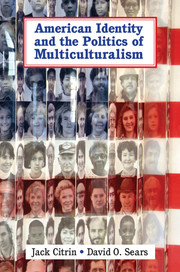Book contents
- Frontmatter
- Dedication
- Contents
- List of Figures
- List of Tables
- Preface
- Prologue
- 1 The Challenge of E Pluribus Unum
- 2 The Political Psychology of Identity Choice
- 3 Contours of American National Identity
- 4 The Ethnic Cauldron and Group Consciousness
- 5 Public Opinion and Multiculturalism’s Guiding Norms
- 6 When Do Ethnic and National Identities Collide?
- 7 Group-Conscious Policies: Ethnic Consensus and Cleavage
- 8 The Dynamics of Group-Conscious Policy Preferences
- 9 Multiculturalism and Party Politics
- 10 Conclusion
- Appendices
- Bibliography
- Index
- References
3 - Contours of American National Identity
Published online by Cambridge University Press: 05 September 2014
- Frontmatter
- Dedication
- Contents
- List of Figures
- List of Tables
- Preface
- Prologue
- 1 The Challenge of E Pluribus Unum
- 2 The Political Psychology of Identity Choice
- 3 Contours of American National Identity
- 4 The Ethnic Cauldron and Group Consciousness
- 5 Public Opinion and Multiculturalism’s Guiding Norms
- 6 When Do Ethnic and National Identities Collide?
- 7 Group-Conscious Policies: Ethnic Consensus and Cleavage
- 8 The Dynamics of Group-Conscious Policy Preferences
- 9 Multiculturalism and Party Politics
- 10 Conclusion
- Appendices
- Bibliography
- Index
- References
Summary
All nationalist doctrines insist that allegiance to the nation should override affiliations to less inclusive groups, such as those based on race, religion, language, or class. Writing about the aftermath of colonialism in From Empire to Nation, Rupert Emerson wrote that the nation is “the largest community which, when the chips are down, effectively commands men’s loyalty, overriding the claims both of the lesser communities within it and those which cut across it or potentially enfold it within a still greater society.” Whether this claim about the strength and pervasiveness of identification with the nation and the unique importance of this identity still holds in the United States is the subject of this chapter.
Has the conflation of demographic change, due largely to immigration, and identity politics prompted an overall weakening of Americans’ national identity and a widening of ethnic fault lines in patriotic sentiment? Pessimistic observers highlight distinctive threats to national attachment in all the country’s main ethnic groups. Samuel Huntington singles out Hispanic immigration, arguing that the mass entry and geographic concentration of these newcomers close to their countries of origin may short-circuit the development of loyalty to the United States that occurred among earlier immigrant waves. If Huntington is correct about the future attitudes of American Latinos, then the fact that they are the fastest growing segment of a projected majority-minority society is a significant challenge to the traditional meaning of e pluribus unum.
- Type
- Chapter
- Information
- American Identity and the Politics of Multiculturalism , pp. 56 - 87Publisher: Cambridge University PressPrint publication year: 2014

